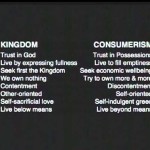We run our website the way we wished the whole internet worked: we provide high quality original content with no ads. We are funded solely by your direct support. Please consider supporting this project.
Loving Enemies in the Day of ISIS
The following excerpt from Myth of a Christian Religion discusses Jesus’ command to “turn the other cheek.” Whatever our response to the persecution of Christians in the world, we must take this passage seriously. While this excerpt does not tell us exactly how to respond, it can be used to shape our attitude and stance toward terrorism and persecution.
_____________
Jesus said, “You have heard it was said, ‘Eye for an eye, and tooth for tooth.’ But I tell you, do not resist an evil person. If anyone slaps you on the right cheek, turn to them the other check also.” (Matt. 5:38-39).
The Old Testament taught that retaliation against an offending party is justified as long as the retaliation is proportional to the offense. If someone pokes your eye out, for example you have the right to take out one (but not both) of theirs. This quid pro quo mindset is foundational to the ethics of the Old Testament, as evidenced by how much the Old Testament concerns itself with precise reparations to be paid to people who have been wronged in various ways. Amazingly, in the passage we are discussing Jesus announced that this quid pro quo has been abolished in the Kingdom he brings.
In sharp contrast to the Old Testament, Jesus teaches that his followers should not “resist an evil person.” He then illustrates what he means by telling his disciples to “turn to them the other cheek also” when struck.
Although it might appear that Jesus is telling his followers to be passive, masochistic, doormats in the face of evil, that is not what he’s suggesting. The word translated “resist” (antistenai) doesn’t necessarily suggest passivity. Rather, it connotes responding to a violent action with a similar violent action. We aren’t to passively let evil have its way, but neither are we to sink to the level of the evil being perpetrated against us by responding in kind. Our response is rather to be consistent with loving the offender.
This sheds light on why Jesus said, “If anyone strikes you on the right cheek, turn to them the other cheek also.” He was most likely referring to the practices of Roman guards using the back of their right hand to slap the right cheek of Jewish subjects. This was an insulting slap, used to demean subjects and keep them in their place. Responding to such a strike by offering the left cheek was a way of defiantly rising above the intended humiliation.
The thrust of Jesus’ teaching in this passage, then, is that Kingdom people are to respond to evil in a way that doesn’t allow the evil they’re confronting to define them. We aren’t to be passive, and we aren’t to be doormats. But because we aren’t to be defined by the evil we confront, neither are we to become violent. As we noted above, the quid pro quo mindset has been entirely abolished in the Kingdom Jesus brings.
Paul makes the same point: “Do not be overcome by evil, but overcome evil with good” (Rom 12:21). When we respond to hostility by becoming hostile, we allow the evil in the heart of the enemy to define us. We are “overcome by evil.” But when we resist the urge to retaliate and instead respond to an enemy with love—feeding them if they’re hungry and giving them something to drink if they’re thirsty (vs 20)—we allow love to define us and open up the possibility that the enemy will be transformed into a friend. We are overcoming evil with good.
Though refusing to respond to enemies with force may look weak to the “normal” way of thinking, the truth is that the love that refuses to retaliate is the most powerful force in the universe. Laws may control behavior and violence may annihilate enemies, but only this kind of love has the power to transform the heart of an enemy. It’s the only response to evil that doesn’t perpetuate evil. (96-97)
Category: General
Tags: Enemy Love, ISIS, Kingdom Living, Love, Love Your Enemies, Myth of a Christian Religion, Persecution
Related Reading

Responding to the Negative Fallout of Trump’s Election
Yesterday I suggested that we refrain from judging the motivations of brothers and sisters who voted for Donald Trump (see post). As the young lady I spoke with illustrates, a person could genuinely grieve over the negative implications Trump’s Presidency might have for certain people groups but nevertheless believe that there are considerations that outweigh these negative implications…

The Kingdom Stance Toward Enemies
Jesus was praying in the garden of Gethsemane, when a group of temple guards showed up to arrest him. Peter immediately drew his sword and started swinging it, cutting off a guard’s ear. From the world’s point of view, this violence was justified. Peter was simply defending himself and his master. Yet Jesus rebuked him,…

The Risk of Love & the Source of Evil
On Sunday Greg tweeted the following: Love IS a tremendous risk. But if humans ever concluded the risk was not worth it, we likely become extinct rather quickly. … Yes, love is risky. It costs us everything, and we sometimes get terribly hurt. But it’s this risk that “makes the world go round.” … And…

Is Islam Inherently Violent? – Further Thoughts
Greg originally posted some thoughts on Islam here. In this video, he discusses some responses he received, and further thoughts on a Kingdom posture toward Muslims.

Consumer Wars: Sermon Clip
To go along with our other post today, here’s a clip from Greg’s sermon last week. If you don’t have any financial margin in your life, this might have something to do with it. You can find the entire sermon here.

5 Differences Between The Kingdom of God and the Kingdom of the World
Image by matthijs rouw via Flickr The kingdom of God looks and acts like Jesus Christ, like Calvary, like God’s eternal, triune love. It consists of people graciously embracing others and sacrificing themselves in service to others. It consists of people trusting and employing “power under” rather than “power over,” even when they, like Jesus, suffer because…

